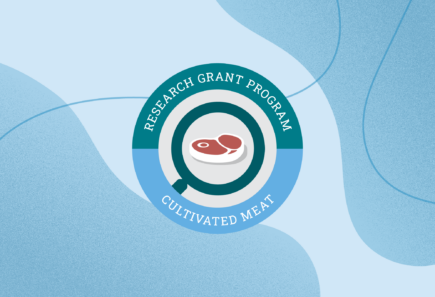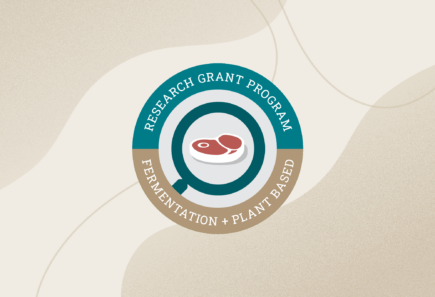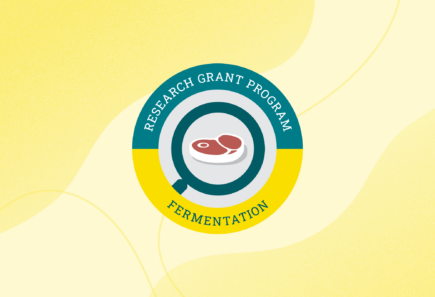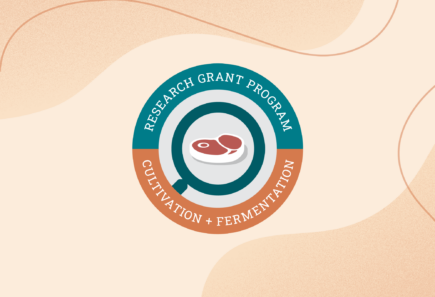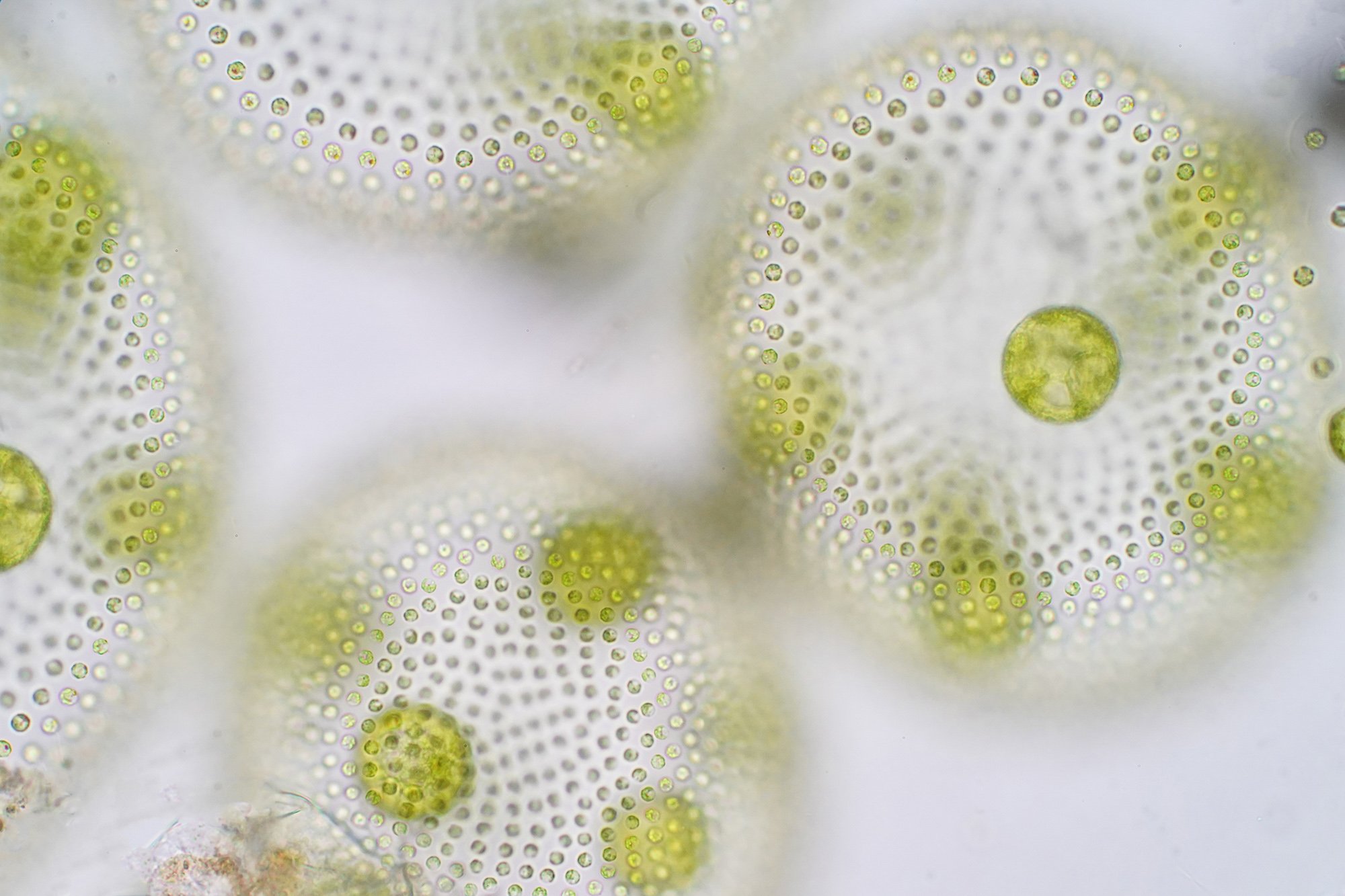
Science
Cultivated meat, plant-based products, and fermentation offer exciting research opportunities with tremendous positive impacts for the climate and global health.
As a nonprofit, GFI is dedicated to advancing foundational, open-access research in alternative proteins and creating a thriving research and training ecosystem around these game-changing fields.
Laying the scientific foundation
Our work provides a rigorous foundation for advancing the fundamental scientific breakthroughs that enable alternative proteins to succeed. We analyze the industry to identify key knowledge gaps, allocate grant funding toward the highest-impact research projects, and cultivate an engaged community of scientists to forge collaborations and bolster the technical talent pipeline. We are charting a roadmap to overcome pre-competitive technical challenges through open-access research and accelerate the rate of progress across the alternative protein industry.
Analyzing knowledge gaps and white space opportunities
Identifying crucial knowledge gaps and articulating technological solutions requires a deep understanding of the science in alternative proteins and across parallel fields. Rigorous industry analyses such as life cycle assessments and technoeconomic analyses also provide critical insights for identifying the most impactful levers for improving the taste, texture, price, and sustainability of alternative protein products.
Through a combination of in-house analysis and collaborative partnerships, we are charting a roadmap for addressing technological shortcomings through open-access research and technology development.
Allocating funding toward high-impact research
In an emerging field like alternative proteins, research funding has an outsized catalytic effect, serving to generate preliminary data that stimulates follow-on investment from conventional funding mechanisms. Our Research Grant Program can rapidly deploy funding for mission-critical projects while supporting our researchers to ensure swift commercial translation of their work.
In parallel, our team of experts also serves in an advisory capacity to strategically guide grant-making decisions by other research funders and to support investigators in crafting high-impact proposals.
Building global scientific communities and cultivating talent
Most scientists and engineers working in alternative protein research are relatively new to the field, applying their skills from a wide array of fields to this decidedly interdisciplinary endeavor.
Through our seminar series, researcher communities, collaborative workshops, and on-campus student groups, we build bridges and foster connections throughout the global scientific community. These activities also build a robust pipeline of technical talent, which is often cited as a bottleneck to growth within the alternative protein industry.
Technical deep-dives

The science of plant-based meat
Learn about the science of plant-based meat. Discover resources and research on the latest technological developments and key scientific questions.

The science of cultivated meat
Learn about the science of cultivated meat and the challenges that must be addressed for commercial production.

The science of fermentation
Learn about the emerging role of microbial fermentation in building the next generation of alternative protein products.

Page
Technical analyses and reports
Our technical analyses and reports identify solutions for alternative protein taste, price, scale parity, and improved environmental sustainability.
Research ideas
GFI identifies the most pressing technological bottlenecks and prioritizes the most promising solutions to accelerating alternative proteins. Tap into our solutions database to discover ideas for research projects, find inspiration for new commercial ventures and products, and explore ecosystem-level interventions to accelerate the field.
Tools and databases
Explore our library of research tools and databases that are designed to advance research, foster connection, accelerate learning, and help scientists overcome key technological bottlenecks like access to cell lines and research tools.
Research Grant Program
Fueled by our generous donors, we are excited to introduce our most recent cohort of open-access alternative protein research projects. Our program also supports researchers with resources to help identify funding opportunities and more.
Projects selected for funding in 2024

Join our global scientific community
Our Alternative Protein Researcher Directory makes it easier for scientists to find collaborators with complementary skills so that together they can accelerate the transition to the next generation of meat, eggs, and dairy. Join our community of researchers today to forge connections, find industry and academic collaborators, and learn about the latest in alternative protein science.

Seminar series: The Science of Alt Protein
Every month, an academic or industry scientist from the field of alternative protein presents their latest research, explores an interesting research question, or identifies white space opportunities that warrant further exploration.

Resource
Needs assessment on building an inclusive alternative protein workforce
This report reviews challenges faced by scholars from underrepresented groups and describes opportunities for GFI and its partners to transform career development experiences for these individuals.

Page
The Alt Protein Project
Students play a pivotal role in building the alternative protein ecosystem. Explore how you can start a student group at your university to accelerate the global transition to the future…

Page
Alternative protein career portal
Discover rewarding alternative protein jobs. Gain insights on building your career and find open positions in this exciting industry.

Online course: The science behind alternative proteins
Enroll in GFI’s open-access online course to learn about the science of plant-based and cultivated meat.
Meet our experts

Amanda Hildebrand, Ph.D.
VICE PRESIDENT, SCIENCE AND TECHNOLOGY
Amanda Hildebrand oversees GFI’s Science and Technology department to build a roadmap for accelerating alternative protein research while empowering scientists to execute on this vision.
Areas of expertise: bioprocess development and commercialization, project and team leadership, fermentation, kinetic modeling

Elliot Swartz, Ph.D.
SENIOR PRINCIPAL SCIENTIST, CULTIVATED MEAT
Elliot Swartz analyzes scientific progress and bottlenecks in cultivated meat.
Areas of expertise: cultivated meat: cell culture media, costs, and environmental impact

Claire Bomkamp, Ph.D.
SENIOR LEAD SCIENTIST, CULTIVATED MEAT & SEAFOOD
Claire Bomkamp is focused on cultivated seafood and driving forward GFI’s Sustainable Seafood Initiative.
Areas of expertise: the science and technology of cultivated seafood, cultivated seafood startups, research, and university programs, scaffolding, science communication, fish puns.

Nikhita Mansukhani Kogar, Ph.D.
PRINCIPAL SCIENTIST, PLANT-BASED
Nikhita is focused on the technical landscape of plant-based proteins and how to expand their impact and adoption.
Areas of expertise: plant-based product development, materials science, physicochemical characterization, food chemistry

Priera Panescu Scott, Ph.D.
SENIOR LEAD SCIENTIST, PLANT-BASED
Priera Panescu Scott is focused on analyzing plant-based meat and proteins and how to best expedite their progress.
Areas of Expertise: food and agriculture systems, materials science, polymer chemistry, plant-based ingredients






